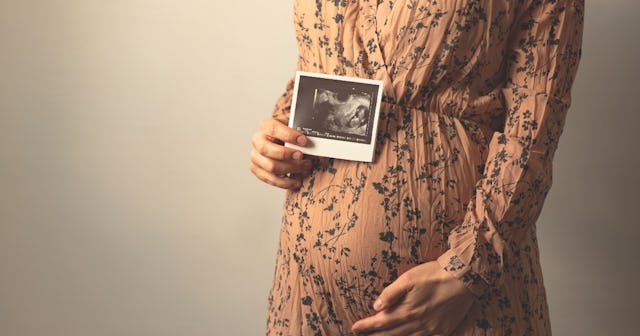What Happens During Placental Abruption In Pregnancy?

It may feel as though you’re living at your OB-GYN’s office while you’re pregnant, between the routine check-ins and testing. But aside from ultrasound printouts to add to a baby-book-in-progress, these screenings and regular visits are an important part of prenatal care. That way, if the doctor spots something a little out-of-the-ordinary, they can address it right away and give both you and your baby the best care possible. Or, in some cases, the doctor may find something that could affect the birthing process and timeline, like a placental abruption, that might require bed rest and/or a cesarean section.
Here’s what to know about placental abruption, including the symptoms, treatments, what it means for labor and delivery, and the potential effects the condition could have on the baby.
RELATED: What Does It Mean To Have A Calcified Placenta In Pregnancy?
What is a placental abruption?
A placental abruption — sometimes referred to by its medical term: placenta abruption — occurs when the placenta detaches from the wall of the uterus before delivery. There are two types of placental abruption: a partial separation, and a complete (or total) separation, the American Pregnancy Association explains. Most placental abruptions are partial separations. Approximately one percent of pregnancies involve this complication, and most can be treated successfully.
According to the Mayo Clinic and MedlinePlus, the most common symptoms of placental abruption include:
- Vaginal bleeding (although approximately 20 percent of pregnant people with the condition don’t experience this symptom)
- Painful contractions, often coming one right after another
- Abdominal pain
- Back pain
- Uterine tenderness or rigidity
What is the most common cause of placental abruption?
While the precise cause of placental abruption is unknown, certain risk factors increase a person’s risk of experiencing it, according to MedlinePlus. These include:
- Pregnancy after a previous placental abruption
- Long-term (chronic) high blood pressure
- Sudden high blood pressure in people who had normal blood pressure in the past
- Heart disease
- Abdominal trauma
- Smoking
- Alcohol or cocaine use
- Fibroids in the uterus
- An injury to the pregnant person (such as a car crash or fall in which the abdomen was hit)
- Being older than 40
A diagnosis of placental abruption is made following a physical exam from your healthcare provider — including observing your contractions and how your baby responds to them. Occasionally, the exam will involve an ultrasound to get a look at your placenta, but placental abruptions don’t always show up on ultrasounds, MedlinePlus explains.
Can exercise cause placental abruption?
Pregnant women are often encouraged to stay active and do light exercise during pregnancy. However, it is important not to overdo it and stay away from activities that may cause a fall or that involve jumping. Exercise may not cause placental abruption, but abdominal trauma will.
Can a placental abruption heal?
The treatment for a placental abruption largely depends on the severity of the separation, as well as how close the baby is to being full-term. Unfortunately once the placenta separates from the uterus, it cannot be reattached.
If the placental abruption happens earlier on in pregnancy and is relatively mild, the pregnant person will likely be hospitalized while they’re still bleeding. Then, if the bleeding stops and the baby’s condition appears to be stable, they may be able to return home to continue their bedrest, the Mayo Clinic explains. The pregnant individual may also be given medication to help speed up the baby’s lung development and protect their brain, in case they have to make an entrance earlier than expected.
When a mild placental abruption occurs after 34 weeks of pregnancy, the person will likely stay in the hospital until they give birth, which may be possible via a closely monitored vaginal delivery. In cases when the placental abruption before or during labor is more severe, an emergency delivery is required, and usually happens via C-section.
Can a baby survive a placental abruption?
While a placental abruption may cause fetal distress — especially if the baby’s blood and oxygen supply is affected — most babies can (and do) survive this complication. In rare circumstances, however, if the placental abruption was severe, the baby can be stillborn, according to MedlinePlus. Also, if the placental abruption restricts the fetus from getting the oxygen and nutrients it needs in the womb, its growth might be restricted, but again, that’s rare.
You may also be wondering how dangerous a placental abruption is for the person who is pregnant. You should know that those who suffer placental abruption rarely die, but it is possible (although, again, far less likely than other outcomes). Such extreme occurrences can be the result of delayed diagnosis and treatment.
Is there placental abruption treatment?
Unfortunately, the answer is no. Currently, there is no way for medical professionals to stop a placental abruption or reconnect the placenta. Although there is no treatment, it can be managed based on how far along you are and how much bleeding you are experiencing. Taking note of these factors allows doctors to determine which delivery (vaginal or cesarean) would work best for your condition.
This article was originally published on